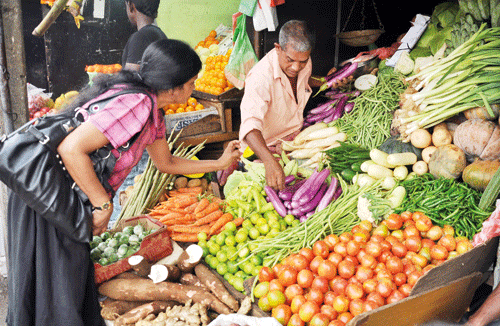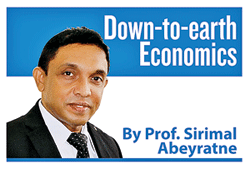Global recession deepens
View(s):
File picture of a local market. Food prices will be hit badly in the event of another recession.
With much speculation of a global recession, should we expect more impediments to expected foreign exchange inflows to Sri Lanka and further delays in the country’s recovery from the economic crisis? It was a timely issue that was raised at a webinar by PricewaterhouseCoopers Academy where I had to deliver a speech a few weeks ago.
The world economy is entering another recession and we are caught up in it too. Sri Lanka is already in an unprecedented economic crisis of its own and battered with domestic supply shortages, skyrocketing inflation, foreign exchange shortages and a foreign debt payment. When we blend the two issues together, what would be the economic outcome of Sri Lanka within the next couple of months?
I thought of shedding some light on this critical issue today. Above and beyond all worse things that we have to discuss, in fact, I am excited too, when I think of the statement that “there is a silver lining in every cloud”.
Another recession
As the world economy entered a global economic crisis some one and a half years ago, it has been in a deeper and a longer recession. While the world economy never recovered fully from the global financial crisis in 2008/2009, it had to face a massive health crisis during the past two years due to the COVID-19 pandemic. While it never had enough time to recover from the economic fallout of the health crisis, there are now again signs of another economic recession.
It’s more of an economic “stagflation” – slower economic growth, combined with higher inflation. The World Bank has cut down the world’s growth forecasts significantly. The advanced countries in the world, which grew by over 5 per cent last year, have been estimated to grow this year in 2022 only by nearly half of that – 2.6 per cent. Among the advanced countries, the rate of real GDP growth of the US is estimated to decline from 5.7 per cent in 2021 to 2.5 per cent in 2022; and that of the Euro area from 5.4 per cent to 2.5 per cent during the same time period.
 China, which did well in managing the COVID-19 issue and which had high growth rates in the world in the recent past – is expected to grow by 4.3 per cent, a decline from 8.1 per cent the previous year. While the fast growth of China has been overtaken recently by India, the Indian rate of GDP growth is still likely to report 7.5 per cent rate.
China, which did well in managing the COVID-19 issue and which had high growth rates in the world in the recent past – is expected to grow by 4.3 per cent, a decline from 8.1 per cent the previous year. While the fast growth of China has been overtaken recently by India, the Indian rate of GDP growth is still likely to report 7.5 per cent rate.
The slowdown in the growth of the world economy – particularly the advanced countries -, would drag the recovery of many developing countries resulting in slower growth and slower trade. Besides, it would also exert pressure on their debt service payments. From a socioeconomic point of view, the world recession would have far reaching implications on the poor and the vulnerable population segments in developing countries.
Inflationary pressure
It’s not only slower growth that would exert pressure on the global economy, but also rising inflation and resultant tight monetary policies. The advanced countries are already experiencing the highest inflation after 40 years. It was in the 1980s, that the world experienced both high inflation and high interest rates. Now the world is back to the same episode again.
The US has reported its headline inflation rate as 9.1 per cent for the last month, the UK 9.4 per cent and, the Euro area 8.6 per cent. Japan had been experiencing the deflationary fear for about three decades, and even adopted policies without success to raise the rate of inflation; but last month Japan also reported 2.5 per cent inflation.
The increase in the global demand against the subdued global supply due to the Russian invasion in Ukraine has played a major role in the current high inflation in the world. While the global supply chain interruptions due to the COVID-19 pandemic continue to bring pressure on prices, the surge in global demand after the COVID-19 lockdown problems seems quicker. The result is inflation.
Inflation has also brought monetary tightening and high interest rates, hurting the global credit expansion. All advanced countries except Japan have increased policy rates in the past few months influencing higher interest rates in the world economy. The higher interest rates in advanced countries would also hurt the developing countries due to foreign exchange outflows; this would add further pressure to their exchange rates.
Global capital flows
In spite of the negative impact of the world recession in developing countries as explained above, if there is any hope for them is due to changes in world capital outflows in the form of foreign direct investment (FDI). Due to historical differences in wealth creation, it is the world’s advanced countries which have accumulated a larger share of the world capital. World capital flows out in global economic recessions, seeking better investment locations.
Let me elaborate my point: About 25 years ago, world FDI flows accounted for about US$200 – 300 billion a year. It increased exponentially to around $1,500 billion after 2000. Secondly, an increasing share of world FDI started to flow into developing countries; about 25 years ago, the developing country share of world capital was about 20 – 25 per cent, while it increased to over 50 per cent during the recent past.
In fact, it is interesting to note that on the one hand, capital flows out during recessions and makes the recession even faster in advanced countries. On the other hand, many developing countries were prepared to accommodate such FDI flows into developing countries opening their economies to globalisation; and it helped these countries to accelerate their export drive and to achieve higher growth momentum.
In the same way, new relocation waves of world capital may be expected out of the current recession in advanced countries. In fact, this trend is already observable, while the developing countries which were prepared to offer competitive investment environments are able to attract outflowing world capital. As a result, while the advanced countries which are experiencing capital outflows would experience further slowdown in their economies, the developing countries which would experience capital inflows would experience achieving their growth momentum even in the midst of world economic recessions.
FDI and exports
Among the South Asian countries, India has attracted $64 billion FDI in 2020, compared to less than half a billion in Sri Lanka. Among the Southeast Asian countries, Singapore has attracted $90 billion FDI, Vietnam has also secured $16 billion; among the poorer countries in the region, Myanmar has received $2 billion and Cambodia $4 billion.
Sri Lanka’s current economic crisis is primarily due to the country’s weak export growth, so that the sustainable answer to the crisis is accelerating its export growth. This is the reason why Sri Lanka should be prepared to welcome world FDI outflows.
However, the country’s poor FDI record indicates that we have not yet prepared the groundwork to welcome and accommodate the anticipated global FDI outflows from the global recessions. This should be the primary focus of Sri Lanka’s attempt to provide a long-term solution to the country’s economic crisis.
When the global economy is heading towards another recession, it also brings about, not only challenges for developing countries, but also new opportunities for them to benefit from. Redirection of world capital flows is an opportunity as such – a silver lining in every cloud.
(The writer is a Professor of Economics at the University of Colombo and can be reached at sirimal@econ.cmb.ac.lk
and follow on Twitter @SirimalAshoka).
Hitad.lk has you covered with quality used or brand new cars for sale that are budget friendly yet reliable! Now is the time to sell your old ride for something more attractive to today's modern automotive market demands. Browse through our selection of affordable options now on Hitad.lk before deciding on what will work best for you!


